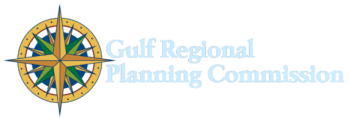About GRPC
Gulf Regional Planning Commission (GRPC) provides general planning support to fifteen-member governments, which include twelve cities- Gulfport, Biloxi, Waveland, Bay St. Louis, Diamondhead, Pass Christian, Long Beach, Ocean Springs, D’Iberville, Gautier, Pascagoula and Moss Point- as well as the three coastal MS counties- Hancock, Harrison and Jackson. GRPC is administered by an appointed Board of Commissioners from across the coast that meet monthly to conduct the administrative business of the agency.
In order to meet the diverse needs of the member governments, the GRPC professional planning and technical support staff undertake a variety of work assignments, and produce custom-scaled products, including land use surveys, GIS maps, mitigation plans, data analysis, sustainability and comprehensive plans. Additionally, the staff conduct a variety of education outreach and awareness events regarding agency projects and programs.
In December 1973, the Governor of Mississippi designated GRPC to serve as the Mississippi Gulf Coast Metropolitan Planning Organization (MPO) for the urbanized areas of Gulfport-Biloxi and Pascagoula-Moss Point. The GRPC/MPO transportation planning process is certified by the Federal Highway Administration, which allows GRPC to manage the Surface Transportation Program funds that are allocated to the urban areas. The MPO is governed by a policy committee of elected officials and advised by a technical committee that meet on a quarterly basis.
In its capacity as a regional governmental planning agency, GRPC works closely with the local public agencies and the citizens of the MS Gulf Coast to provide information and tools that support the regional decision-making process. As the MPO, GRPC staff work diligently to promote a safe, efficient and fiscally sound transportation system that serves the travel needs of coastal residents, businesses and visitors.
In order to meet the diverse needs of the MS gulf coast community, GRPC’s professional staff provide a wide variety of planning and programming services including;
- Grant Administration and Program Development
- Data Collection and Analysis
- GIS Applications and Mapping
- Traffic Counts and Travel Demand Modeling
- Urban and Regional Land Use Planning
- Transit Program Development and Planning
- Transportation Planning (Congestion Management, Alternative Transportation Systems, Air Quality Conformity, and Road Safety for All Users.
- Land Use Planning and Scenario Modeling
- Disaster Recovery and Resilience Planning
- Travel Time Data Analysis and Reporting
- Comprehensive Plan Development
- Bicycle and Pedestrian Projects and Plans
- Transit Route and Infrastructure Planning
- Air Quality Education and Outreach
